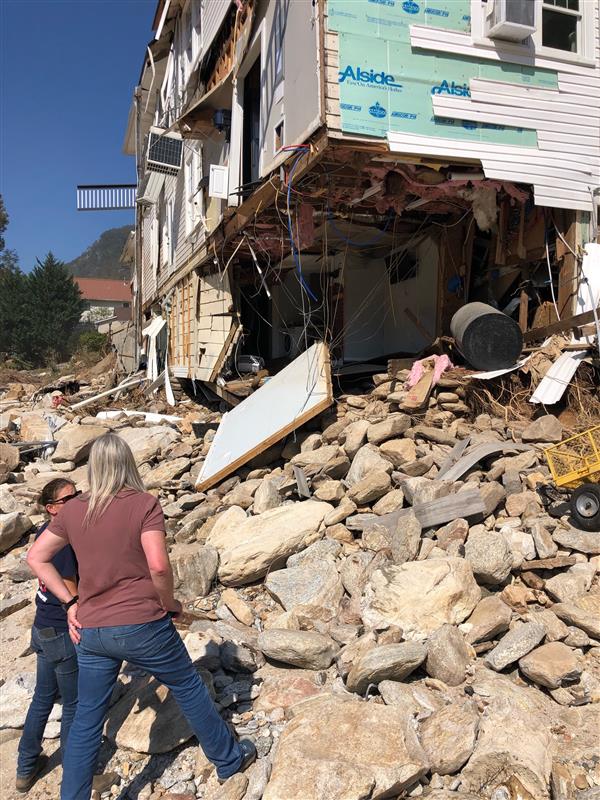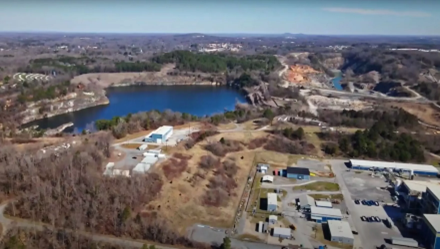
The Thrasher Group North Carolina is proud of how our team came together to support communities impacted by the devastation caused by the natural disaster Hurricane Helene in the Fall of 2024.
While employees volunteering and collecting essential supplies helped to meet immediate needs, we know our largest contribution will happen over time – as we serve in our roles as land surveyors, engineers, and construction managers.
Western NC faces a long road ahead. Full recovery, including restoring and rebuilding critical infrastructure like utilities and roads will likely take years. Below are some ways that land surveyors and engineers play an essential role in long-term recovery after a natural disaster.
Funding and Compliance for Natural Disaster Recovery
Securing funding (a natural disaster means unexpected and unbudgeted costs) and ensuring compliance with local, state and federal regulations adds another level of complexity to rebuilding efforts.
FEMA’s public assistance program, for example, requires communities to meet specific criteria such as being located in a declared disaster area and proving that they’ve incurred eligible costs. Qualifying for this program requires detailed documentation with which seasoned surveying and engineering teams can support.
Additionally, plans for rebuilding structures must meet detailed requirements, for example, specific elevations (to reduce future flood damage risk) or floodproofing measures like flood vents or watertight doors. Local building codes and zoning ordinances also require permits and inspections to ensure compliance with safety standards. Even new infrastructure and utilities systems must adhere to design standards, quality control and safety regulations
Experienced surveyors and engineers should be well-equipped to assess damages and plan compliant reconstruction efforts, while also helping communities navigate FEMA and state funding processes.

Land Surveying for Infrastructure and Environmental Recovery
Land surveyors play a critical role in the aftermath of hurricanes and other natural disasters. Surveyors help to assess the extent of damage to land and property and identify changes in land elevation and topography. They are also key in re-establishing property lines and boundaries, especially when natural disasters move or obscure original boundary markers. Land surveyors also conduct infrastructure surveys, which map and measure roads, bridges, pipelines, and power lines. Surveys also provide the foundational data needed to make informed decisions about environmental recovery, protecting water resources and stabilizing the soil.
By providing critical baseline data on infrastructure and land conditions after a natural event, surveyors empower communities to rebuild stronger. This is especially important after devastating events like Hurricane Helene, when the ground itself may have been compromised from flooding and a large number of structures impacted. Timely and accurate surveying work is key to help prioritize and guide rebuilding efforts in a way that will prevent future risk from natural disasters.
Structural Engineering for Rebuilding and Long-Term Safety
While land surveyors help to ensure rebuilding occurs on stable ground and within the correct boundaries, structural engineers ensure that the design of new or rebuilt structures and buildings are safe, stable and durable.
In the immediate aftermath of a natural disaster, structural engineers are on the front lines assessing the structural integrity of impacted structures and documenting damaged and collapsed buildings. These assessments tell authorities whether structures are safe to inhabit as is or need reinforcement before its occupants or residents can return. In extreme cases, structures may be condemned and slated for demolition.
From this documentation, engineers can also begin to develop structure repair plans and strengthening measures, designing new structures to withstand future disasters. For example, engineers may suggest incorporating features like retaining walls, drainage systems and flood barriers to mitigate future risks like landslides and flooding.

Transportation and Water Engineering in the Aftermath of a Disaster
Civil engineers specializing in transportation and water engineering have a special role to play in the immediate aftermath of a disaster. They are key in providing clear and timely information to local authorities about water quality and transportation safety.
Transportation engineers work to assess damage to highways, roads, bridges, parking decks and sidewalks. Authorities use this information to communicate which are or are not passable and safe. Water engineers perform water quality testing, which local authorities use to decide whether they should issue public health notices for contaminated drinking water. If a notice is issued, citizens will need immediate access to clean water, linking back to the need for passable roads to deliver supplies. (Even in the event of a boil water advisory, bottled water is ideal as boiling water only kills pathogens, but can’t remove many other contaminants.)
Restoring access to roads and bridges (so that citizens can get to safety and supplies can flow freely) and critical resources like water will always be most pressing immediately following a catastrophic natural event. Information provided by engineers informs prioritization of areas that require immediate attention based on access to emergency services, critical infrastructure and population density.
Once water and transportation engineers play their more immediate roles, they can then get to work on long-term infrastructure and utilities improvement. These civil engineers create the plans for rebuilding transportation and utilities infrastructure, all while taking into account factors like climate change, future land use and patterns.
They work to design rebuilt infrastructure for increased resilience to future natural disasters, for example, elevated roads or water treatment facilities, flood-resistant bridge designs and early warning systems. Many civil engineering firms can also provide construction management services and oversight, to ensure that the new infrastructure built adheres to the original plans provided.
Does your community need support?
Whether it’s restoring critical infrastructure like roads and bridges or rebuilding essential utilities, Thrasher NC is committed to tailoring solutions to each community’s unique needs. Contact us today and we’d be happy to help learn your community’s story and assist with current surveying, engineering and construction management needs.

